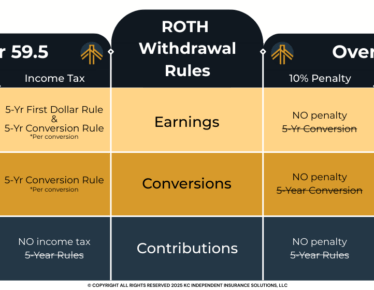Annuities: Let’s Talk About the Good, the Bad, and the Misunderstood
You’ve probably heard a lot of mixed opinions about annuities. Some people say they’re bad investments, others warn you’ll lose access to your money or face high fees, and many feel they’re just too complicated.
Here’s the truth: Some of those concerns are valid, but most of them lack context. Let’s take a moment to break down the facts so you can decide whether any type of annuity makes sense for your retirement strategy.
What Is an Annuity?
At its core, an annuity is simply a contract with an insurance company. You give them money, and in return, they give you certain guarantees—most commonly, income for life, principal protection, or tax-deferred growth.
There are five main types of annuities, and they all function differently:
1. Immediate Annuity (a.k.a. Annuitization or Pension)
Think of immediate annuities as creating your pension. You hand over a lump sum to an insurance company and, in return, receive guaranteed payments for life. Social Security and government pensions work the same way.
Pros:
- Lifetime income you cannot outlive
- Recession-resistant
- No management fees
- Peace of mind—you don’t have to worry about market volatility
Cons:
- No access to your principal after purchase
- No ability to change or cancel once it starts
- Usually, no money left for heirs
- You’re dependent on the insurance company’s long-term solvency
Bottom line: This is like a “set it and forget it” approach. Suitable for those who prioritize guaranteed income over flexibility.
2. Fixed Annuity
Fixed annuities are one of the simplest annuities. You receive a guaranteed interest rate for a specific number of years, very similar to a CD (Certificate of Deposit) from a bank.
Pros:
- Principal protection
- Guaranteed fixed interest
- Tax-deferred growth
- No market risk
- Typically, no fees
- Access to up to 10% of your money annually (penalty-free)
Cons:
- Limited growth potential (especially in low-rate environments)
- May not keep up with inflation
- Surrender penalties apply if cashed in early
3. Variable Annuity
Variable annuities are tied to the stock market and carry investment risk. You can earn more, but also lose principal, just like with mutual funds or ETFs.
Pros:
- Potential for higher growth
- Tax-deferred
- Optional benefits (riders) for income or death protection
Cons:
- Principal risk
- High fees (often 3–5% annually)
- Complex structure
- It may not be worth the cost unless the optional benefits are truly needed
4. Fixed Index Annuity (FIA)
Fixed index annuities are a middle ground between fixed and variable annuities. Your returns link to a market index (like the S&P 500), but your principal is never at risk.
Pros:
- Market-linked growth without market loss
- Tax-deferred
- No fees in most cases
- Optional income riders
- Access to part of your funds annually
Cons:
- Gains are capped or limited by “participation rates”
- Low growth potential in low-rate environments
- Complexity in how crediting works
- Some products have long surrender periods (3–10 years)
5. Hybrid Pension Annuity
Hybrid pension annuities are a modern solution that combines the features of traditional pensions with the flexibility of owning your money. You start with a deferred annuity (usually a FIA or a variable annuity) and add a lifetime income rider.
Pros:
- Guaranteed lifetime income
- Retain control and access to your money
- Can leave a legacy for heirs
- No need to fully annuitize
Cons:
- Rider fees (usually 0.75%–1.25%)
- Some plans require waiting 5–10 years before activating the income
- Not all hybrid annuities are created equal—some have poor payout ratios or restrictions
About Fees and Commissions
One concern I often hear is, “Aren’t annuities loaded with hidden fees?” That’s a fair question—and the answer depends on the type of annuity:
- Immediate and fixed annuities often have no fees.
Fixed indexed annuities typically have 0%–1% optional rider fees, or no fees at all. - Variable annuities have the highest fees (3%–5%), so they should be selected carefully.
As for commissions, yes, insurance agents are paid a commission by the insurance company. But in most cases, this does not come from your investment. It’s a one-time cost built into the product and not deducted from your principal.
Compare that to a typical 1% AUM fee charged every year by many investment advisors. Over 30–40 years, which adds up to a lot more than a one-time commission.
So, Are Annuities Bad?
No, annuities aren’t bad—they’re just misunderstood. But that doesn’t mean they’re always the right fit either. The key is understanding:
- What do you want your money to do (grow, provide income, protect principal)
- How long until you’ll need the income
- Your risk tolerance
- Your need for legacy planning
Sometimes an annuity can be a perfect complement to your retirement strategy—especially when you want a guaranteed income floor to pair with more aggressive investments elsewhere.
Next Steps
If you’re curious about whether a hybrid pension annuity or any other annuity type fits into your plan, let’s schedule a time to talk through your goals and current portfolio.
As your advisor, I’ll always make sure you fully understand the pros, cons, and alternatives before making any financial decision—no pressure—just education and transparency.
Let’s make sure you retire with both confidence and control.
Contact Us Get in Touch
Have a question or feedback?
Fill out the form below, and we’ll respond promptly!

By providing your name and contact information, you are consenting to receive calls, text messages, and/or emails from a licensed insurance agent about Medicare Plans at the number provided. You agree that such calls and/or text messages may use an auto-dialer or robocall, even if you are on a government do-not-call registry. This agreement is not a condition of enrollment.
Not connected with or endorsed by the United States government or the federal Medicare program. This is a solicitation of insurance, and your response may generate communication from a licensed producer/agent.



